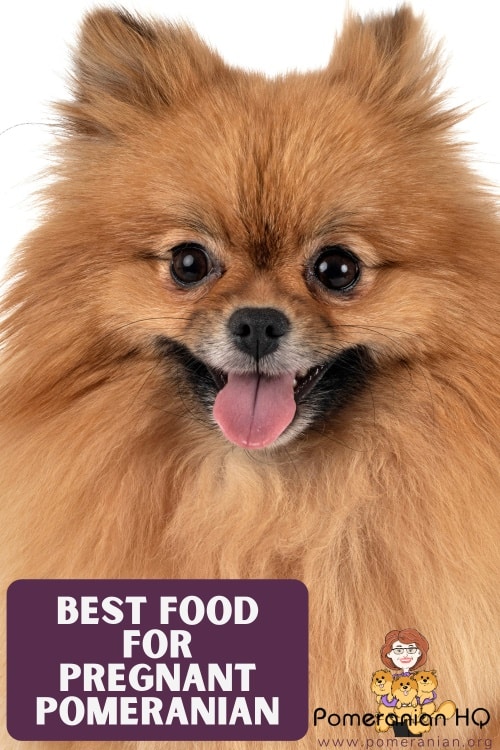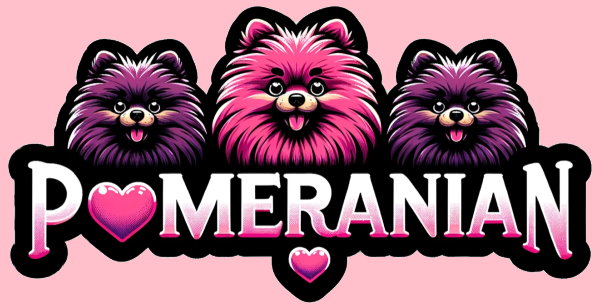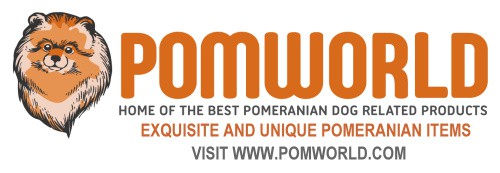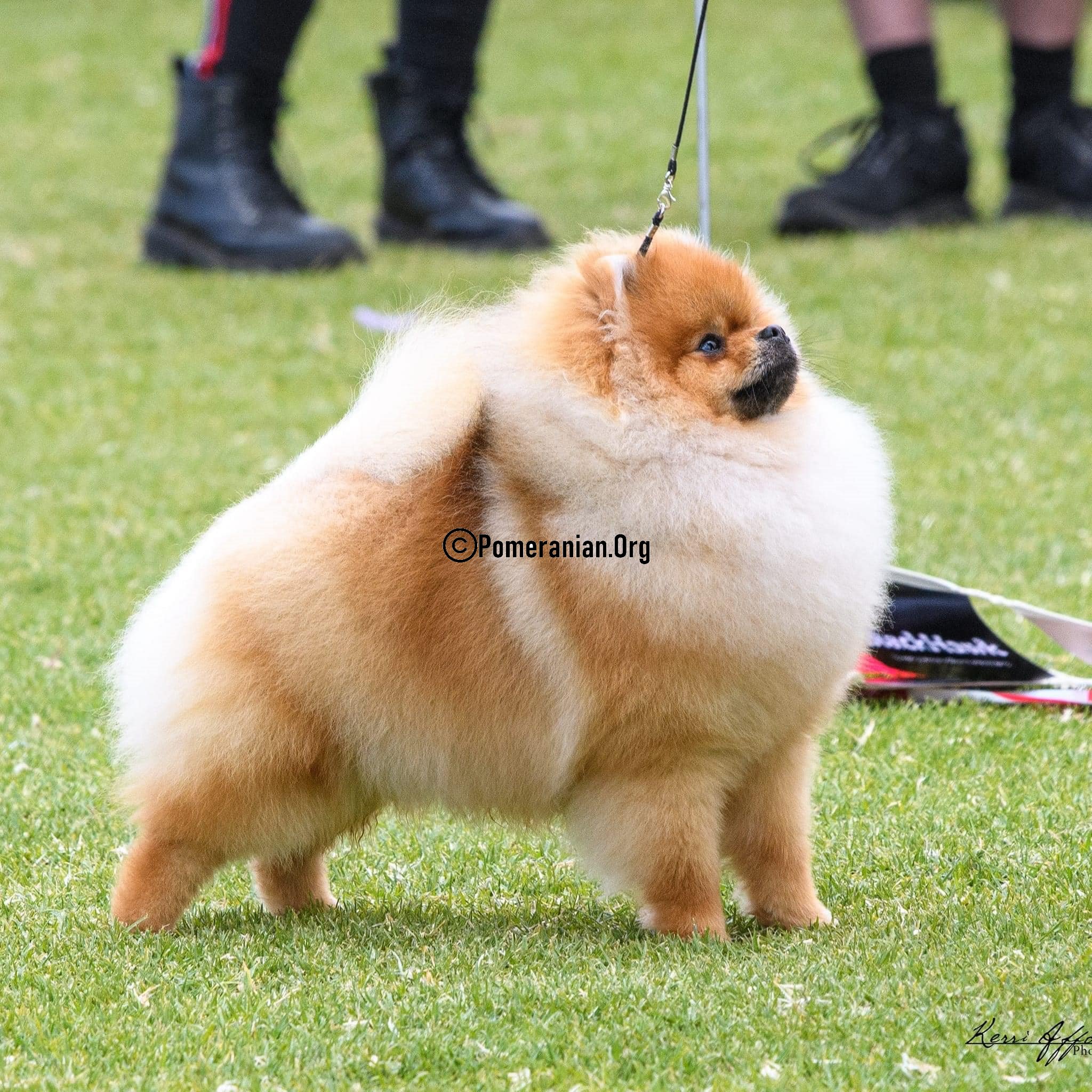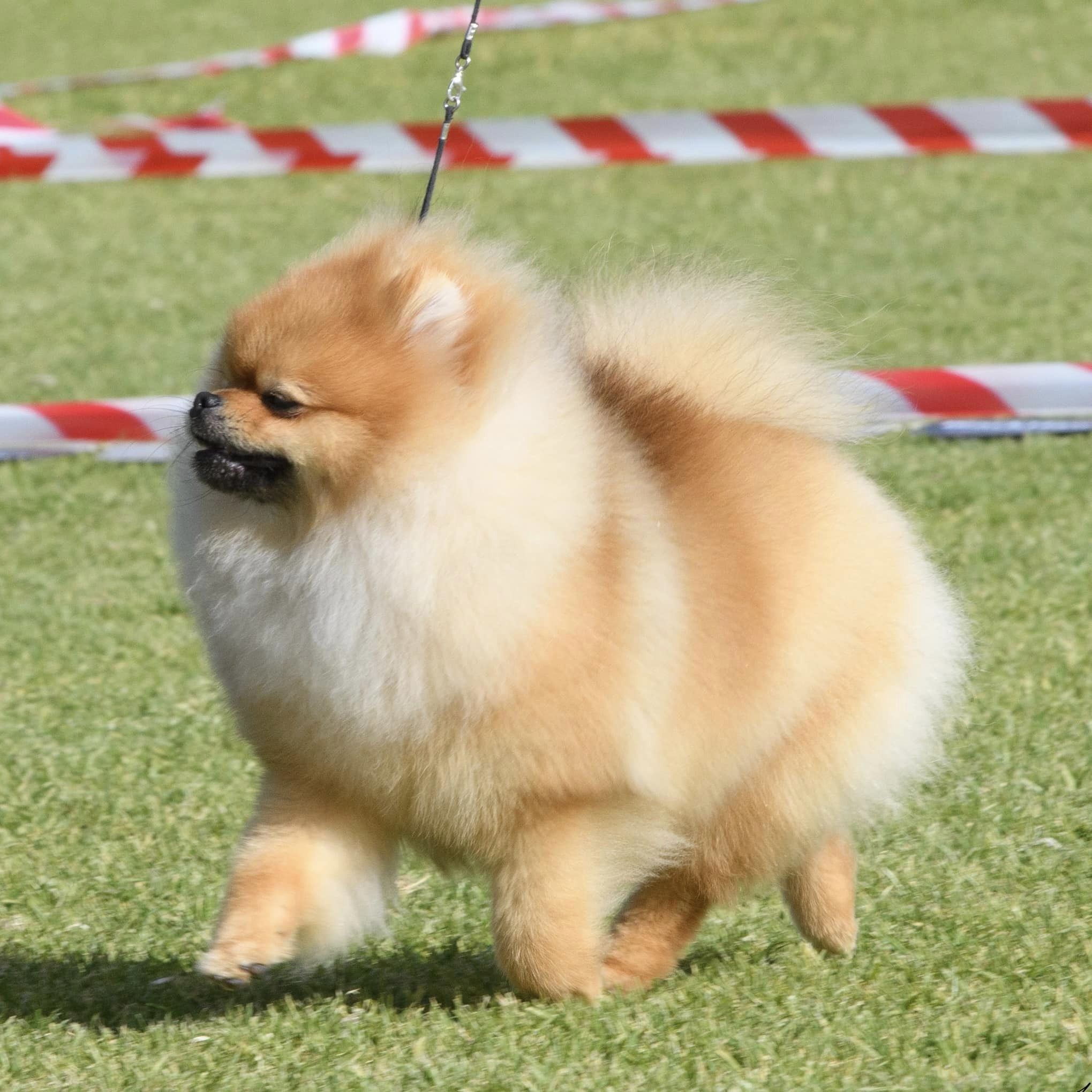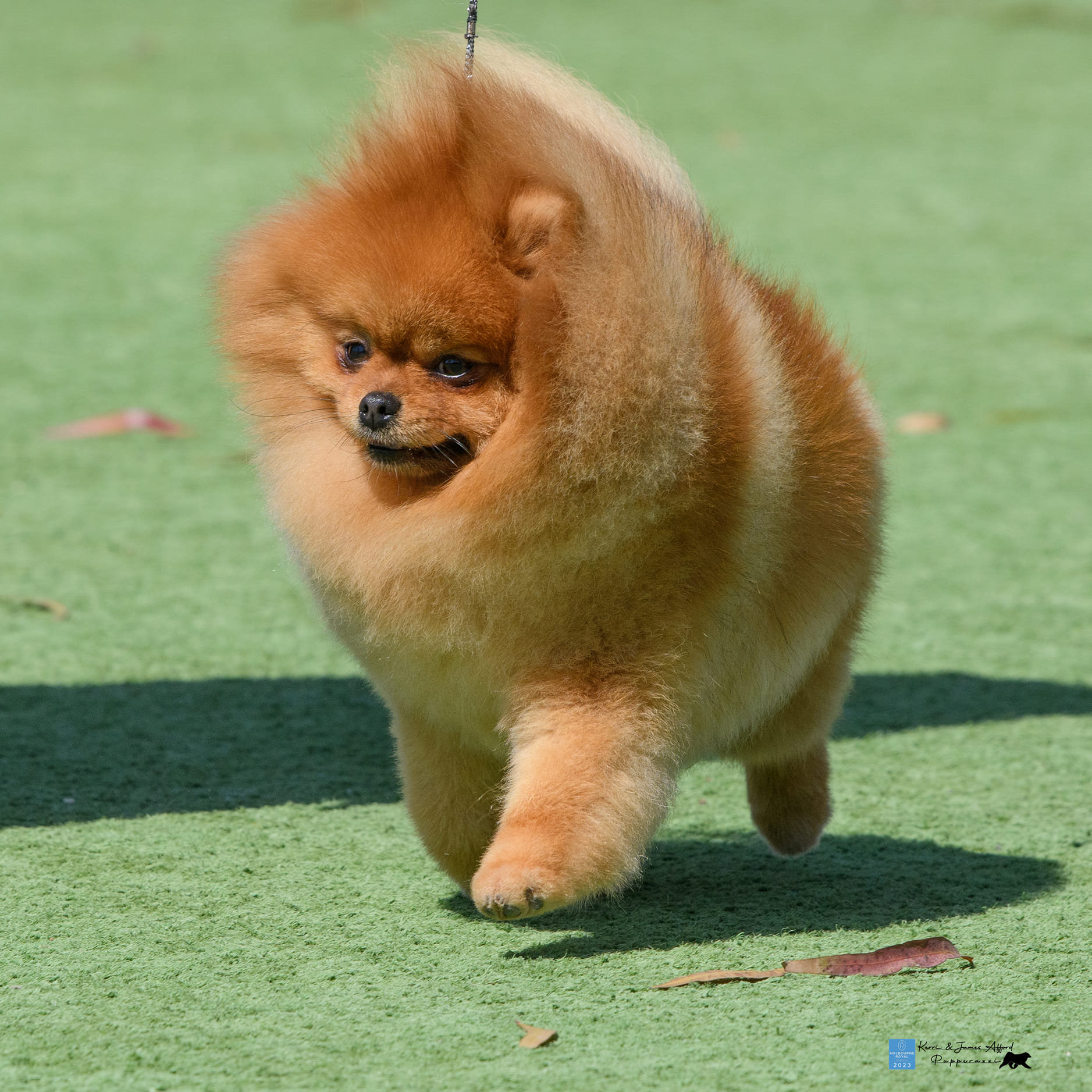Last Updated on 30/04/2024 by Denise Leo. Post first published on April 29, 2024.
Written by Denise Leo, a distinguished figure in Pomeranian breeding, in partnership with our resident veterinarian, Dr. Muqeet Mushtaq. Dr. Mushtaq, a graduate of the University of Animal and Veterinary Sciences (2019) and a recipient of an MSc (Hons.) in Animal Breeding & Genetics from the University of Agriculture Faisalabad (2021), brings valuable expertise to this collaboration.
Everyone understands maternal care’s importance during pregnancy, from conception to delivery. As with human mothers, ensuring a Pomeranian’s health before breeding is crucial for producing healthy litters. Once pregnant, her diet becomes even more critical.
Though her nutritional needs increase only slightly in the first half of gestation, providing high-quality, well-balanced food is essential for developing her puppies. This ensures proper brain development, healthy milk production, and overall well-being for the mother and her newborns.
A successful pregnancy hinges on proper nutrition and the health of both dams and pups. Proper nutrition is key to a healthy pregnancy. A high-quality diet consisting of small meals is recommended, which provides the correct energy requirements and the right balance of nutrients.
Best Food for Pregnant Pomeranian Females
Choose food that’s easy to digest. It should be a top-grade commercial diet for puppies during pregnancy and lactation because this food will have the correct calcium-phosphorus balance. Calcium supplements should only be provided by feeding more dairy products, e.g., puppy milk and cottage cheese.
Mixing supplements and meat products may decrease the amount of carbohydrates in the diet, which can cause stillbirths and hypoglycemia (low blood sugar).
If the food is high quality, supplements aren’t recommended. If the bitch takes in too much vitamin D or calcium, it may calcify soft tissue in the fetus and cause other possible defects. Lactation does need lots of calcium, but supplements throughout the pregnancy won’t stop the depletion of calcium when lactating (aka eclampsia) and could make the problem far worse.
Dog Food for Pregnant Female Pomeranian
If you and your vet believe your female dog will be a viable candidate for breeding, a thorough examination should be carried out to determine if she’s fit and healthy. She may have physical issues that could jeopardize the pregnancy and whelping, along with any inheritable problems that could cause serious problems.
This is when the time comes for the more intense screening. The vet needs to assess and treat her for external and internal parasites that may affect her health and/or could be passed onto her litter. She must be given all the correct vaccinations, as the vet determines.
The mother dog needs to be weighed as that helps in the overall evaluation of her health. Changes will generally be made to her diet, in the amounts and quality of foods she eats, to help her achieve the ideal weight. If a bitch is overweight or underweight, breeding won’t be as successful.
It’s a common belief among veterinary nutritionists that if a female dog is malnourished before breeding. Throughout pregnancy, it will seriously affect the mortality rate of the puppies, which will be 20-30%.

As with performance and growth, the reproduction cycle is a physiological state with specific nutritional demands far greater than a typical maintenance phase. A dam drains her nutritional stockpile during pregnancy and shortly after birth. If she’s malnourished, she won’t have enough energy, minerals, vitamins, and protein to carry the litter to term.
There are four ways malnourishment can occur:
• If her diet consists of low-quality food.
• If she doesn’t have enough high-quality food.
• If her diet isn’t properly balanced, ensure she gets sufficient nutrients.
• If she isn’t eating because the food isn’t palatable and you don’t notice.
It can happen during any part of the reproductive cycle. However, the most hazardous time is in the later part of pregnancy when her body’s demand for proper nutrition is at its peak.
If the female dog isn’t fed the right way, her health (and the health of her litter) may be impaired in many ways, including:
• Low conception rates and birth defects.
• Difficulty carrying the whole litter to term.
• Trouble during labor.
• Problems with mammary development (thus affecting the volume and quality of colostrum and milk produced.
• Female Pomeranian underweight or overweight dogs may also experience some of these issues.
If the dam hasn’t been fed sufficient nutrients during pregnancy, her puppies and immune systems can be seriously affected. When the immune system is being formed and developed, it’s extremely sensitive to nutritional inadequacies, and it may not perform as well during future pregnancies, even if you get her nutrition levels back to where they should be.
It’s common for a dam’s malnourishment not to be obvious until it’s too late. She may be out of shape and thin when she’s whelped and lacks body fat and muscle reserves to handle lactation.
As a result, her puppies may face “fading puppy syndrome,” which symptoms include frequent crying, weakness in their looks, lack of coordination, and lack of appetite. Some puppies don’t survive for long.
Most vets will conduct blood tests on breeding females before breeding to determine whether the female is healthy and has been on a good diet so her nutrition levels are good.
The test will also check whether she has low blood protein or is anemic. If these issues exist, it’s time to reverse the malnourishment and bring the dam’s health back into good stead before breeding can start.
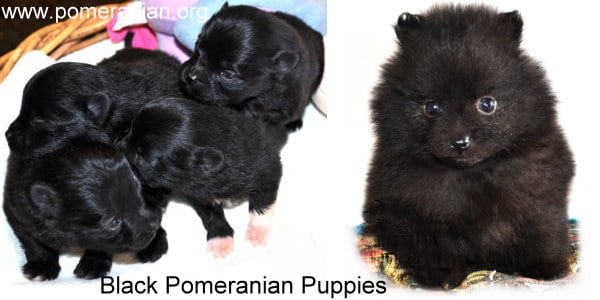
Pregnant Dog Food Guide for Pomeranians
If you’re feeding your dam a well-balanced, high-quality puppy/lactation balance, the volume of food the dam should eat during the first 5-6 weeks of gestation doesn’t need to be increased by more than 10% of normal. The reason is that the fetus grows less than 30% within that period. However, the last 3-4 weeks before birth will see a rapid growth increase.
You need to gradually increase your dam’s food consumption so it’s 15-25% higher than normal when it comes to whelping. This helps increase the dam’s nutritional stores and weight. It’s common for her appetite to decrease late in the period because her abdomen becomes distended. The smartest thing to do is feed her 2-3 times daily, so she still gets sufficient nutrients throughout the pregnancy.
It’s critical to maintain a high level of nutritional balance through the last trimester, and, as explained earlier, this means feeding her 2-3 times per day. Her diet should be well-balanced, high-quality, palatable lactation/puppy growth food so she has enough reserves to maintain her good health and that of the puppies as they grow closer to being born.
This will also help them remain healthy during the initial few weeks of life. If she doesn’t get enough of all the right nutrients before whelping and during lactation, serious problems may occur, possibly causing the death of one or more puppies.
Despite the increased nutritional needs of a pregnant female dog, deficiencies of all the right nutrients are most likely to happen once the puppies have been born and the new mother’s body has experienced enormous stress due to the heavy demands required for lactation.
There are two main goals of a good quality diet:
1. To take in enough nutrition to increase her weight by 25-35% by the time she’s ready to give birth.
2. To help maintain the ideal weight after giving birth, she must make enough amounts of colostrum and milk to help her puppies grow until weaning time.
Ideally, her diet should include 29% protein, 17% dietary fat, and no more than 5% fiber. It’s all measured as dry weight, not based on calories. If this describes her diet, then she should cope well with the rigors of growing puppies and lactation.

Consequences of an Incorrect Diet
If you don’t feed your dam correctly, she may be out of condition, thin and underweight, and have brittle fur and/or bad muscle tone. These issues will only get worse during the lactation period.
She may decide to eat more food to get enough nutrition, but this may cause seriously bad diarrhea. Breeders always watch for problems and adjust their diet by improving aspects of the food they use, such as volume and/or quality and types.
Pomeranian Whelping
Most dams stop eating approx. 12 hours before whelping, and their body temperature will drop by 1-2 degrees. You must encourage her to drink more water and/or ice to avoid dehydration, labor problems, weakness, and low-quality milk.
Another problem is milk letdown. This is when milk moves from the upper section of the milk secretion gland to the lower part, where the nipple is ready for the puppies to suckle.
Once the mother has given birth, she must return to her diet quickly. An overly attentive or new mother could be reluctant to move away from her puppies. If she doesn’t move, bring water and food to her. Some new mothers will be anorexic after being whelped, but it only lasts a couple of days.
Breeders entice them to eat by giving them all sorts of treats, including roast chicken breast, ice cream, special cat food, puppy meal replacements, and various homemade mixtures. The basic idea at this point is to get her to eat anything.
A few days of treats won’t hurt her, but they may help her return to eating normally quicker. Warming food before serving is another way to entice your Pomeranian girl to eat.
If you have concerns about your new mother not drinking sufficient fluids, feed warm canned puppy food mixed with milk to a very sloppy mixture for a few days.
Dog Lactation
During the dog lactation period, nutritional deficiencies are quite common. Her body prioritizes how and where nutrients are used, and lactation and growth of the litter are top of the list. She will exhaust all her reserves to support that action, often risking her health at the same time. So you must ensure she gets enough nutrition to maintain a good weight while the puppies suckle.
Nutrients are required in ever-increasing amounts. Giving her enough calories isn’t enough, so you must ensure her food has a minimum of 17% fat content. The number of calories needed varies according to:
• The Dam’s needs and temperament.
• The size of the puppies.
• The number of puppies.
The larger the number of puppies, the more milk and nutrients are required. Small dog breeds such as the Pomeranian often have a higher energy need per pound weight.
Small breed dogs can be fed commercial growth/lactation and high-quality cat food because it has higher nutritional value and more calories. If the bitch is nervous or temperamental, that expends extra energy, so she needs more to balance again.
The general guide is that when she’s at peak lactation, it’s wise to feed her 25% more food for every puppy in her litter to help keep her at a healthy weight range. For example, if she eats two cups of food daily and her litter has six puppies, you would feed her five cups each day.
Another guide for increasing her intake of food above the maintenance amount is this way:
• Week 1 of lactation: increase the food amount by 1.5.
• Week 2 of lactation: increase food amount times 2.
• Week 3 of lactation: increase food amount times 3.
Of course, the breeder can decide how to do it himself. If she’s eating food, she needs three meals per day.
How to Feed Your Pomeranian Mother to Produce More Milk
A dog’s dietary needs are crucial for the mother’s and her puppies’ health and development during pregnancy and lactation. Opting for high-quality puppy food or a specialized formula for nursing mothers can provide essential nutrients.
Wet food, thanks to its elevated moisture levels, can be an advantageous option for your canine companion. It aids in hydration and digestion, ensuring your dog’s comfort. New mums may benefit from a diet with low fiber content to prevent gastrointestinal upset and ensure nutrient absorption.
Offering fresh water at all times is essential for milk production and hydration, especially during lactation. Remember, moderation is key. Feeding small amounts of food regularly ensures adequate nutrition without overloading the mother’s system, giving you the confidence to provide the right amount.
A lactation diet should provide high-quality ingredients that support the mother’s health and the puppy’s development. Incorporating good options such as lean proteins like [specific lean protein], healthy fats such as [specific healthy fat], and complex carbohydrates like [specific complex carbohydrate] can help meet the increased energy demands during this period.
It’s important to regulate portion sizes closely to avoid overfeeding or underfeeding and ensure the mother receives sufficient nourishment without excess weight gain.
By paying attention to the dietary needs of the lactating or pregnant dog, including the appropriate use of wet food and high-quality puppy food, pet parents can support the health and well-being of both the mother and her newborn puppies.
I have a Pomeranian girl who can’t make enough milk to satisfy her litter. What can I do to boost her milk production? This is a very typical issue for female toy dogs. A healthy diet and the right supplements can mostly fix the problem.
However, there have been times when the female dog has a severe hormone deficiency, and no supplements will overcome the issue. If this is the case with your Pomeranian girl, it’s wisest to get her spayed and then give her to a pet home so she won’t have to endure such problems again.
A female dog must be able to produce sufficient milk even before conception. She has to be in the best health before allowing her to breed. She must also eat the right diet, i.e., foods full of all vital nutrients to help with a healthy pregnancy.
If your female dog does not usually create enough milk, give her some premium foods and a tablespoon of cottage cheese or plain yogurt. I also like to feed her fresh minced chicken frames daily during her pregnancy.
If you know your dam has experienced issues with milk production, you can feed her ½ cup of goat’s milk each day during the pregnancy because it often produces amazing results.
- Micro Ingredients offers a pure unadulterated goat milk powdered formula that is sourced directly from premium farms in Australia and is derived from natural grass-fed sources, resulting in a sweet and creamy flavor that is easy on the stomach.
- Each pouch contains 2lbs of farm direct goat milk powder, providing 129 servings per package, perfect for those looking for a long-term supply of easily digestible and nutrient dense goat milk powder.
- Low lactose levels make this goat milk powder an excellent option for those with lactose intolerance, while its rich source of protein, calcium, and probiotics make it a perfect addition to any diet.
- Not only is this goat milk powder a great choice for human consumption, but it is also pet friendly, making it an ideal addition to homemade soap, creamer, yogurt, and raw food diets for dogs and cats.
- Premium non-GMO goat milk powder supplement. Made without soy, dairy, gluten, fillers, preservatives, flavors, and tree nuts. Ingredients must pass our 3rd party lab tests to ensure a product that is safe, pure, and potent.
After the whelping, you can give her a mixture of the following ingredients each morning and evening.
- 1 tablespoon of premium canned dog food.
- One tablespoon of plain yogurt.
- ½ a cup of goat’s milk (or one scoop of goat’s milk powder + ½ a cup of water).
- Herbs such as: goat’s rue, fennel seed, milk thistle, hops flower, fenugreek and red raspberry leaf.
- FORMULATED FOR SMALL BREED PUPPIES: Royal Canin Small Breed Puppy Wet Dog Food is formulated for puppies from 2 to 10 months old with an expected adult weight of up to 22 lb
- SOFT TEXTURE: The tasty thin slices in gravy soft food texture makes it easy for growing small breed puppies to eat
- IMMUNE SUPPORT: Clinically proven antioxidants, including vitamins E and C, help support the healthy development of your puppy’s immune system
- MICROBIOME SUPPORT: Prebiotics and highly digestible proteins help promote a balance of intestinal bacteria for digestive health and optimal stool quality
- BRAIN DEVELOPMENT: This wet puppy food is enriched with DHA, an omega-3 fatty acid, scientifically proven to help support your puppy’s brain development
Best Food for Whelping Dogs
Most canine foods have insufficient nutritional density (particularly regarding calories) to handle lactation. Using these foods is the main cause of malnutrition. If your bitch is eating free-choice food and is thin by the whelping time, her caloric density and food quality are both too low.
If this describes your Pomeranian female dog, changing the food and buying higher-calorie-dense, superior-quality foods would be better. If desperate, add a fat source for each cup of dried food, such as one tablespoon. Vegetable oil is okay to use and will increase calories by 30%.
- FORMULATED FOR MOTHERS & BABYDOGS: Royal Canin Small Starter Mother and Babydog Dry Dog Food is tailor-made for the mother’s high energy needs at the end of gestation and during lactation for the nursing puppies’ optimal growth up to 2 months old
- HEALTHY GROWTH: Nutritional response helps to facilitate the transition from mother’s milk to solid food
- IMMUNE SUPPORT: Clinically proven antioxidants, including vitamins E and C, help support the healthy development of puppies’ immune systems
- MICROBIOME SUPPORT: A combination of prebiotics and highly digestible proteins helps promote a healthy balance of intestinal bacteria for digestive health and optimal stool quality
- REHYDRATABLE KIBBLE: The kibble can be turned into a porridge-like consistency that’s palatable for both the mother and her weaning puppies
- SMALL BREED PUPPY FOOD: Royal Canin Small Breed Dry Puppy Food for puppies 2 to 10 months with an expected adult weight of 9 to 22 lbs
- CRUNCHY KIBBLE: Crunchy kibble texture is simple to serve and pairs perfectly with Royal Canin Small Puppy Thin Slices in Gravy canned puppy food
- GROWTH AND DEVELOPMENT: Small breed dog food for puppies supports brain development and energy needs during growth
- IMMUNE SUPPORT AND DIGESTIVE HEALTH: Antioxidants support the immune system, while prebiotics and proteins promote gut health
- MIXED FEEDING: Give your dog a savory textured meal by mixing in Royal Canin Small Puppy Thin Slices in Gravy canned puppy food
- REAL MEAT FIRST: Chicken is the #1 ingredient in this high-protein Blue Buffalo puppy food
- ESSENTIAL NUTRITION FOR PUPPIES: This puppy dog food supports cognitive development with DHA, and it provides energy for growth and play
- IMMUNE SYSTEM SUPPORT: High protein dry dog food that contains exclusive, antioxidant-rich LifeSource Bits
- HEALTHY, WHOLESOME INGREDIENTS: This Blue Buffalo dog food is made with no chicken (or poultry) by-product meals and no corn, wheat, or soy
- Contains: One (1) 4-lb. bag of Baby BLUE Healthy Growth Small Breed Puppy Dry Dog Food, Chicken and Oatmeal Recipe
- REAL MEAT FIRST: This Blue Buffalo dry dog food is made with real, high-quality chicken as the #1 ingredient
- ESSENTIAL NUTRITION FOR PUPPIES: This puppy food supports cognitive development with DHA, and it provides energy for growth and play
- IMMUNE SYSTEM SUPPORT: This puppy food features exclusive antioxidant-rich LifeSource Bits
- HEALTHY, WHOLESOME INGREDIENTS: This Blue Buffalo dog food is made with no chicken (or poultry) by-product meals and no corn, wheat, or soy
- Contains: One (1) 5-lb. trial-size bag of BLUE Life Protection Formula Small Breed Dry Puppy Food, Chicken and Oatmeal Recipe
- REAL CHICKEN FIRST: This puppy food features high-quality protein from real chicken to support healthy muscle development. Plus, it contains wholesome whole grains, garden veggies and fruit
- FOR PUPPIES: Baby BLUE puppy food contains DHA and ARA, important fatty acids found in mother’s milk, to support cognitive function and retinal health
- WITH LIFESOURCE BITS: All BLUE dry dog food contains LifeSource Bits – a precise blend of antioxidants, vitamins and minerals to support your puppy’s healthy immune system
- A NATURAL DOG FOOD: Baby BLUE puppy foods feature the finest natural ingredients enhanced with vitamins, minerals and other nutrients. Plus, they contain NO chicken (or poultry) by-product meals, corn, wheat, soy, artificial flavors or preservatives.
- PACKAGING MAY VARY: Contains one (1) 4-lb bag of Blue Buffalo Baby BLUE Natural Puppy Dry Dog Food, Chicken and Brown Rice Recipe
- REAL MEAT FIRST: Blue Buffalo foods always feature real meat as the first ingredient; High-quality protein from real chicken helps your dog build and maintain healthy muscles; Plus they contain wholesome whole grains, garden veggies and fruit
- FOR PUPPY DOGS: Specially formulated for puppies, BLUE Life Protection Formula Puppy Food contains DHA and ARA (important fatty acids found in mother’s milk) to support cognitive function and retinal health
- ANTIOXIDANT-RICH LIFESOURCE BITS: A precise blend of antioxidants, vitamins and minerals carefully selected by holistic veterinarians and animal nutritionists to support immune system health, life stage needs and a healthy oxidative balance
- A NATURAL DOG FOOD: BLUE dry dog foods are made with the finest natural ingredients enhanced with vitamins and minerals; BLUE contains NO chicken (or poultry) by-product meals, corn, wheat, soy, artificial flavors or preservatives
- PACKAGING MAY VARY: Contains one (1) 30 lb. Bag of BLUE Life Protection Formula Puppy Dry Dog Food, Chicken and Brown Rice
- Complete and Balanced: 100% complete & balanced puppy food with 0% fillers
- Brain Cognition: Contains omega-3 DHA for smarter, more trainable puppies
- Supports Growth: With high-quality protein, this product supports growing muscles
- Supports Immune System: Enriched with antioxidants to support immune system development
- Key Nutrients: IAMS PROACTIVE HEALTH SMART PUPPY contains 22 key nutrients like those found in mother’s milk
- REAL MEAT FIRST: Blue Buffalo foods always feature real meat as the first ingredient; High-quality protein from real chicken helps your dog build and maintain healthy muscles; Plus they contain wholesome whole grains, garden veggies and fruit
- FOR PUPPY DOGS: Specially formulated for puppies, BLUE Life Protection Formula Puppy Food contains DHA and ARA (important fatty acids found in mother’s milk) to support cognitive function and retinal health
- ANTIOXIDANT-RICH LIFESOURCE BITS: A precise blend of antioxidants, vitamins and minerals carefully selected by holistic veterinarians and animal nutritionists to support immune system health, life stage needs and a healthy oxidative balance
- A NATURAL DOG FOOD: BLUE dry dog foods are made with the finest natural ingredients enhanced with vitamins and minerals; BLUE contains NO chicken (or poultry) by-product meals, corn, wheat, soy, artificial flavors or preservatives
- PACKAGING MAY VARY: Contains one (1) 5 lb. Bag of BLUE Life Protection Formula Puppy Dry Dog Food, Chicken and Brown Rice
- WORLD’S FIRST HUMAN GRADE DRY DOG FOOD: Most pet food is something called ‘feed grade.’ Whole Food Clusters are the world’s first human grade dry food — made with 100% human grade ingredients and produced in a human food facility. That means higher quality ingredients and more safety standards, just like you’d expect from your own food!
- A SMART START FOR PUPPIES: This complete and balanced dry puppy food has enhanced protein to support muscular development, boosted DHA for brain health, and double the probiotics for digestive system support. Suitable for large breed puppies as well as adult mothers (gestation/lactation).
- PREMIUM NUTRITION: Clusters are thoughtfully prepared using human grade muscle meat & liver, low glycemic carbs, beneficial fats & live probiotics; cold pressed into delicious, bite-size, ready-to-eat pieces.
- MINIMALLY PROCESSED: Clusters are made by mixing small batches of fresh ingredients, cold pressing them into bite-sized clusters, and then gently slow roasting and dehydrating them to maintain the nutrients, aroma and taste of whole foods.
- WE SAY NO TO: This recipe contains no feed grade ingredients, meat meals, fillers, GMO ingredients, artificial flavors or artificial preservatives.
- Real chicken is the first ingredient in this dog food for puppies to help provide the protein he needs for strong, growing muscles, including a healthy heart
- Purina ONE puppy kibble made with DHA, a nutrient found in mothers’ milk, to support vision and brain development and four antioxidant sources to support a healthy immune system
- Easily digestible puppy dog food featuring a SmartBlend of high-quality ingredients, including omega-6 fatty acids, vitamins and minerals, for a shiny coat and healthy skin
- Deliciously crunchy bites and tender meaty morsels deliver great taste in this Purina puppy dry food formula made with no artificial flavors or preservatives
- Purina ONE dry dog food for puppies crafted in Purina-owned, U.S. facilities provides 100 percent nutrition for puppies with 0 percent fillers, so every ingredient has a purpose
Final Thoughts on Best Dog Food for Pregnant Dogs
In summary, offering optimal dog food for pregnant dogs is crucial throughout their pregnancy journey. As they progress through the weeks of pregnancy, ensuring they receive essential nutrients, such as fatty acids and folic acid, contributes to the healthy development of both the mother and her puppies.
Pet parents should carefully monitor the amount of food given, adjusting portions and nutrient intake according to the dog’s pregnancy stage and body condition. A balanced diet, including high-quality protein sources and adequate calcium levels, supports healthy weight gain, energy levels, and milk production.
By offering nutritious meals tailored to their specific needs, dog owners can give their pregnant bitches the best start for nurturing healthy puppies and maintaining their well-being during this exciting and important time.
Ensuring a mother dog is fed high-quality and sufficient quantities of all necessary nutrients cannot be overemphasized.
Copyright Pomeranian.Org. All Rights Reserved.
Disclaimer: The Content is not a substitute for professional veterinarian advice, diagnosis, or treatment. Always seek the advice of your veterinarian with any questions you may have regarding your dog’s medical condition. Never disregard professional advice or delay seeking it because of something you have read on ANY website.
References and Further Reading:
[1] Denise Leo “The Pomeranian Handbook”.
